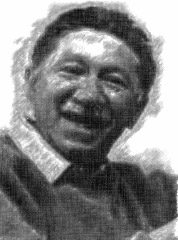The Educational Theory of Abraham Maslow
Analyst: M. L. Fulano de T. |
 |
©2000 NewFoundations
The Educational Theory of Abraham Maslow
Analyst: M. L. Fulano de T. |
 |
RETURN
edited 8/18/11
Theory of Value:
Individuals are driven by needs: safety, respect, esteem. They construct individual value systems that relate to these needs (1: p.40).
As needs are met- individual can explore higher levels of gratification and values change or clarify (1: p. 155).
Adults pass values on to children - if no adults present, children learn from other children (1: p. 229).
Theory of Knowledge:
Knowledge should include acquiring skills related to dealing with realities of life (2:p.224).
Important for children/adults to learn how to learn, rather than absorbing facts (2: p.224).
Knowledge is continuous, flowing, changing, and needs to account for individual needs and development (3: p. 138).
Theory of Human Nature:
All individuals have vast potential that are blocked by unmet needs (1: p. 15 1).
This potential has not fully been regarded by psychologists or educators (1: pp. 215 - 216).
All of us should be able to self-actualize- but children have this potential taken from them (1: p.296)
Theory of Learning:
Learning can only take place when basic needs have been met (1: p.40).
Learner perceive education in more accurate terms when needs are met and learning becomes the priority (2: pp. 321 - 324).
How students emotionally view the world- sets the foundation for learning (3: pp. 132 - 138).
Theory of Transmission:
Stressing of liberal arts especially focused on ethical and developmental issues (2: p. 322).
Educators should strive for excellence - teaching is an art of transmitting a purpose, mission (2: p. 324).
Student leadership development, and development of whole person should be the role of teachers -- affective and cognitive (3: p. 322 - 324).
Theory of Society
Ideal society is one that facilitates individual development to full potential (4: p. 193).
Too much individual attention to development might hamper group goals (3: p. 322).
Society may be a collection of individuals with unfulfilled potential (1: p. 155).
Theory of Opportunity:
Every newborn has the capacity to self-actualize ... Only a few actually do (1: p. 40).
Learning for all of society so that needs can be met, values developed, potential possibly reached (3: p. 332).
Theory of Consensus:
Those whose needs have been met can be critical thinkers and not "slaves" to societal norms (1: p.44).
Self-actualization improves society, culture - from within (1: p. 94).
I. Hoffman, E. (1988). The right to be human. New York: St. Martin's Press.
2. Tuckman, B.W. (1992). Educational psychology : from theory to application. New York: Harcourt Brace Jovanovich.
3. Merriam, S.B. and Caffarefla, R. S. (199 1). Learning in adulthood. San Francisco: Jossey Bass.
4. Nicholi, A.M. (1988). The new harvard guide to psychiatry. Cambridge, MA: Harvard University Press.